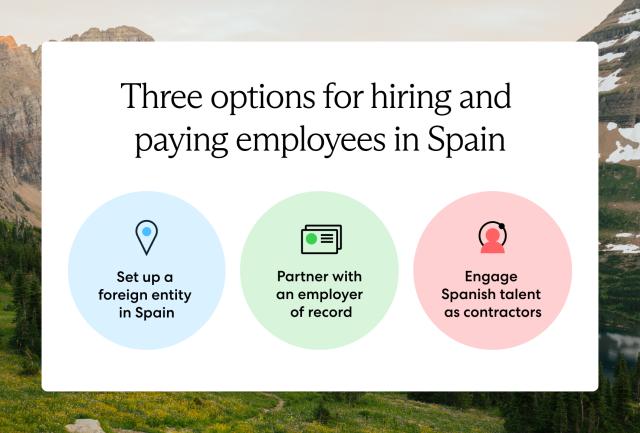Spain’s large talent pool features highly skilled professionals in various industries, from information technology to renewable energy. Engaging Spanish talent can strengthen and diversify your workforce while creating lucrative opportunities in one of Europe’s largest economies.
Still, global companies that hire employees in Spain face unique compliance risks. Overlooking things like worker misclassification and permanent establishment can result in fines, a damaged business reputation, and legal hangups.
This guide outlines everything you need to know about hiring employees in Spain, from compliantly onboarding talent to clarifying your local corporate tax liability. Plus, find out how to hire Spanish employees without setting up a local entity.
Can a U.S. company employ someone in Spain?
Yes, U.S. companies can hire employees in Spain. By establishing a local Spanish entity, partnering with an employer of record, or engaging Spanish contractors, U.S. companies can compliantly hire Spanish talent and enjoy access to one of Europe’s largest economies.
How to hire employees in Spain: 3 options
Global companies have three options for hiring employees in Spain:
- Establish a Spanish entity. Entity establishment enables direct hiring and is ideal for a long-term market presence, though it’s time-consuming and costly.
- Partner with an employer of record (EOR). An EOR is a third-party entity that serves as the legal employer of your global workforce, handling hiring, payroll, benefits, and compliance while you manage your team’s daily duties.
- Hiring Spanish contractors. Engaging contractors offers flexibility and low commitments with greater compliance risk and limited growth opportunities.
The best option for your business depends on your individual circumstances, considering things like time, cost, the number of Spanish employees you wish to hire, and your long-term expansion goals.
We discuss each approach in detail below.

Set up a legal entity in Spain
Do you plan to hire a large Spanish team and develop a long-term presence in the country? If so, establishing a local entity may be ideal for your company.
Setting up an entity in Spain allows you to create a local branch, giving your company full autonomy to hire talent directly and handle employment logistics internally. With this approach, you can run local payroll and establish an in-house legal team to ensure compliance with local employment regulations.
At the same time, entity establishment is complex and time-consuming and requires extensive bandwidth, capital investment, and in-country knowledge of Spain’s legal, corporate, and payroll regulations.
If you prefer a more streamlined approach to hiring employees in Spain, consider partnering with an EOR instead.
Partner with an employer of record (EOR)
Partnering with an EOR offers global companies a simple, low-commitment approach to quickly and compliantly building an international workforce.
An EOR is a third-party entity with global infrastructure and international legal expertise that makes it easy for companies to build global teams quickly and compliantly without establishing local entities or worrying about violating local employment regulations.
A Spanish EOR handles everything from hiring, onboarding, and risk mitigation to running global payroll, administering global benefits, and handling visa and immigration services on your behalf. With this approach, you can easily hire employees in Spain while maintaining complete oversight and daily management of your team.
Partnering with an EOR is an ideal option for companies that want to test the waters of a foreign market before making long-term commitments or companies that want to engage local talent while undergoing incorporation.
Learn more: What Is an Employer of Record (EOR)?
Hire contractors in Spain
A third option for building a Spanish workforce is to engage international contractors. This approach allows you to target Spanish talent with specialized skills for short-term or sporadic projects.
Many global companies enjoy the flexibility of engaging contractors and the cost savings that would otherwise be directed toward hiring, onboarding, administration, and payroll.
On one hand, hiring and paying contractors is less complex than employing and paying full-time employees. However, the risks and penalties associated with engaging contractors, such as worker misclassification, often outweigh the benefits.
We discuss worker misclassification in more detail later on.
Learn more: Should You Hire a Contractor or Employee?
How much does it cost to hire an employee in Spain?
The cost of hiring an employee in Spain is at least 30.4% of the employee’s base salary. This is because the employer must contribute 24.1% of the employee’s salary to social security, 5.5% to unemployment, 0.2% to the wage guarantee fund, and 0.6% to a professional training fund.
Employers must also make varying contributions to a working accident insurance scheme in Spain, which depends on industry and occupation.
Interested in hiring employees in Spain? Use our employee cost calculator below to get reliable insights into employee costs and payroll contributions in Spain:
How are employees paid in Spain?
Spanish employers pay employees monthly in euros (EUR) via cash, check, or bank transfer, while late payments usually accrue interest at a 10% annual rate. Employers must also provide employees with payslips at the end of each pay cycle indicating the pay period and their net earnings and deductions.
Remember that foreign employers that hire Spanish talent must have a local bank account to properly withhold and remit payroll taxes and contributions on behalf of their employees.
Employment laws to know before you hire in Spain
One of the biggest challenges global companies face when building a global workforce is navigating local employment laws in each market where they hire talent.
In Spain, employment laws cover various mandates, including local leave entitlements, probationary periods, severance pay regulations, national holidays, and standard working hours.
Below, we list the standard employment practices in Spain that all global companies operating in this market should know:
- Minimum wage. As of 2024, the minimum wage in Spain is €1,134 per month.
- Working hours. A standard work week in Spain is 40 hours. Any hours an employee works beyond 40 is overtime, which employers must pay at 175% of the employee’s regular wage.
- Probationary period. The maximum probationary period for most employees in Spain is two months; however, for qualified technicians, it’s six months.
- Termination. Spanish law requires employers and employees to provide 15 days’ notice before terminating an employment contract.
- Severance. Severance pay in Spain for termination with just cause amounts to 20 days’ wages for each year of the employee’s service, capped at 12 months of wages.
- Annual leave. Employees in Spain are entitled to a minimum of 30 days’ paid annual leave, although collective bargaining agreements (CBAs) may require more.
- Maternity leave. Mothers in Spain are entitled to 16 weeks of paid maternity leave.
- Parental leave. Fathers also receive 16 weeks of paid paternity leave.
- Sick leave. Employees in Spain are entitled to 17 days’ paid sick leave at 65% pay and 75% after that for up to 365 days.
- Public holidays. Employees in Spain are entitled to 14 paid national holidays plus any applicable regional holidays.
Compliance risks when hiring employees in Spain
In addition to familiarizing themselves with Spanish employment laws, global companies must also understand the compliance risks associated with each aspect of the law.
For instance, correctly classifying talent at the start of your working relationship is critical, but this alone doesn’t ensure compliance over time. To remain compliant, global companies must conduct ongoing audits and legal reviews to stay abreast of evolving laws and changing workplace dynamics.
The primary risks global employers face when hiring employees in Spain involve worker classification, payroll tax regulations, permanent establishment, and immigration requirements.
We discuss each of these in detail below and offer tips for mitigating risk.
Worker misclassification
Worker classification refers to how you designate talent according to local regulations—either as employees or contractors.
While the concept of worker classification is straightforward, Spain uses multiple factors to determine worker classification that don’t always clearly establish what constitutes an employee versus a contractor. The correct employee designation often varies depending on individual circumstances.
Imagine that a foreign company hires a Spanish contractor for a one-off project. The company then hires the same contractor for ongoing work, resulting in regular payments and a steady work schedule that the company slowly begins to control.
As the company increasingly influences when and how their contractor works, local regulators may determine they have an employer-employee relationship. As a result, the company faces misclassification penalties, such as employee back pay, tax arrears, fines, and injunctions.
Further complicating Spanish classification laws is the country’s third category of worker classification called the “dependant self-employed”—a designation for contractors who satisfy the conditions of self-employment but, in practice, are financially dependent on one client.
The evolving nature of worker classification laws also presents an additional risk—as regulations evolve, employers may unknowingly find themselves non-compliant and subject to penalties.
Ensuring your HR team has the necessary knowledge and resources to navigate the complexities of Spanish classification laws and stay abreast of evolving regulations is critical for avoiding fines and legal setbacks.
Read more in our complete guide to employee misclassification.
Incorrect payroll contributions
Another major risk global employers face when hiring employees in Spain is navigating local payroll tax regulations. Foreign employers must clearly understand the taxes and contributions they are liable for withholding from their Spanish employees’ earnings.
Payroll taxes and contributions in Spain include social security, unemployment insurance, the professional training fund, the wage guarantee fund, and working accident insurance. Employers must also withhold and remit income tax on employee earnings and pay 13th and 14th-month salaries.
Ensuring your HR team has the necessary background and skills to navigate Spanish payroll laws is critical for delivering accurate, timely payments to your Spanish workforce and avoiding fines and other penalties.
Permanent establishment
Doing business in any capacity in a foreign country can trigger permanent establishment status, creating a local corporate tax liability for your company. Generally speaking, if a company conducts business from a fixed location abroad, local regulations will deem that company a permanent establishment.
The same is true for Spain. In Spain, various conditions can amount to a fixed place of business, from operating a local office or warehouse to hiring a local agent who executes contracts on a company’s behalf, as long as the agent regularly performs these tasks.
Consider enlisting third-party legal counsel to clarify your permanent establishment status and avoid tax arrears, limited business opportunities, and other penalties. Remember to partner with a well-vetted, experienced firm with local expertise when seeking counsel.
Visa and immigration requirements
While most of the talent you hire in Spain will likely be residents who don’t require visas or permits to work and reside in the country legally, you may encounter a situation where you want to hire a foreign national.
Or, you may have an employee who wants to take advantage of your global mobility program by relocating to Spain. In either case, your HR team must be prepared to navigate Spanish immigration procedures and acquire the necessary visas and permits for your team.
For example, citizens of countries in the European Economic Area (EEA), which includes all 27 member countries of the EU plus Iceland, Liechtenstein, and Norway, don't need a work visa to live and work in Spain. However, all individuals from outside the EEA do.
There are also various types of Spanish work visas, each with unique eligibility requirements, fees, and validity durations.
Learn more: Obtaining a Spain Work Visa: Step-by-Step Guide
Compliantly hire employees in Spain with Velocity Global
When done compliantly, hiring employees in Spain is a savvy business move that creates many lucrative opportunities for global companies. Don’t hold yourself back—partner with an international expert to mitigate risk, save time, and eliminate stress.
Velocity Global’s EOR solution allows global companies to quickly and compliantly build and manage international teams in over 185 countries, including Spain, without first establishing local entities.
Our team handles everything from hiring, onboarding, and compliance to running global payroll, administering global benefits, and offering ongoing HR support on your behalf so you can build a Spanish workforce without the added burden.
By partnering with Velocity Global, you can focus your time on building your team and expanding your business while we handle the rest.
Contact us today to learn how to quickly and compliantly hire employees in Spain from anywhere.
Topic:
Country Guides



